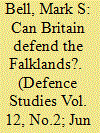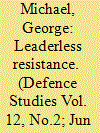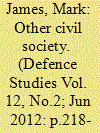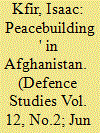|
|
|
Sort Order |
|
|
|
Items / Page
|
|
|
|
|
|
|
| Srl | Item |
| 1 |
ID:
114612


|
|
|
|
|
| Publication |
2012.
|
| Summary/Abstract |
Britain's ability to defend the Falkland Islands from Argentina has been repeatedly challenged by former military leaders and analysts. These concerns have been driven by British defence cuts, the discovery of hydrocarbon reserves close to the Falklands, and increasingly bellicose Argentine rhetoric and actions. This paper evaluates Argentina's capacity to launch an attack on the Falklands and the British capacity to defend against such an attack. Argentina's ability to threaten the Falklands is limited, because Argentina cannot easily neutralise British air superiority over the islands. Even if Argentina could do so, Argentina would find it difficult to bring sufficient troops onto the islands to threaten the Mount Pleasant airfield, or prevent British reinforcements from arriving. Although Britain's current military posture is reasonable, Britain needs a political strategy to counter an Argentine campaign of low-level harassment.
|
|
|
|
|
|
|
|
|
|
|
|
|
|
|
|
| 2 |
ID:
114609


|
|
|
|
|
| Publication |
2012.
|
| Summary/Abstract |
Since 2001, Afghanistan has received over $50 billion in development aid, yet there is scant evidence to suggest that it has been effective in delivering stabilisation or security objectives, and the perceptions of aid are overwhelmingly negative. The unprecedentedly large influx of development aid is also one of the recognised sources of corruption in Afghanistan which itself undercuts Afghan institutions and has seriously damaged the credibility of the Afghan government with its own people. This paper draws on academic and government literature and asserts that while development aid is contributing positively to stability at the tactical level, the unintended consequences of the large flows of financial aid into Afghanistan are undermining its strategic potential to connect the Afghan people to their government. It concludes that unless the international community works together with the Afghan government to tackle corruption head-on, Afghanistan's future development will be fatally compromised.
|
|
|
|
|
|
|
|
|
|
|
|
|
|
|
|
| 3 |
ID:
114613


|
|
|
|
|
| Publication |
2012.
|
| Summary/Abstract |
It becomes clear when analyzing American and South African foreign policy that both countries aim to promote and achieve stability throughout the African continent. Often a necessary component to reach this stability is a military presence to help restore peace during and after conflicts. Therefore, positive military cooperation between both countries would appear to be a simple equation where both would immediately agree. However, this has often not been the case. This paper analyzes this defense relationship from when the ANC-led South African government took power in 1994 until the present day Obama and Zuma administrations. It argues that despite numerous related disagreements throughout the Mandela and Mbeki years, the US-South African defense relationship has expanded. Moreover, this paper concludes that this expansion has escalated since former South African president Thabo Mbeki left office in late 2008. It is not only in America's and South Africa's best interest to see this cooperation expand even further, but in Africa's interest as well.
|
|
|
|
|
|
|
|
|
|
|
|
|
|
|
|
| 4 |
ID:
114611


|
|
|
|
|
| Publication |
2012.
|
| Summary/Abstract |
Increasingly, individuals and small groups are responsible for some of the most lethal acts of terrorism. In many parts of the world, the setting is not conducive to large, clandestine groups insofar as many foreign governments are coordinating their counterterrorism efforts with the US government, as they seek to dismantle terrorist organizations and deny them funding and resources. On the other hand, the emergence of new technology, such as the Internet, allows like-minded activists to operate on their own initiative without the direction of a formal organization - hence, the emergence of leaderless resistance as a new operational strategy and the miniaturization of terrorist and insurgent movements around the world today. The article discusses the development of the leaderless resistance concept and examines four case studies - the American extreme right, the anti-globalization movement, eco-terrorism, and the global Islamic resistance movement.
|
|
|
|
|
|
|
|
|
|
|
|
|
|
|
|
| 5 |
ID:
114610


|
|
|
|
|
| Publication |
2012.
|
| Summary/Abstract |
The essay explores the relationship between organised crime and stabilisation, drawing on case-studies from Afghanistan, Latin America, Russia, and West Africa. It pays particular attention to the role that organised crime does or could play in enhancing stability, and pushes back against a number of easy assumptions: that organised crime is unlikely to be a crucial partner in political settlement; that organised crime will always have a net destabilising effect, and; that organised crime has a distinct identity and an exclusively economic motivation. It concludes that four factors will determine whether or not particular organised criminal networks should be bound into a political settlement or excluded from it: the nature and extent of the public authority exerted by the organised criminal network and the level of legitimacy and support that it enjoys; the role of the organised criminal network in the 'governance subversion' nexus; the role of the organised criminal network in the 'logistical nexus', or its links with insurgents, terrorists and other militant groups, and; the impact on the stabilisation narrative and on the reputation of the host government, the UK and the international community.
|
|
|
|
|
|
|
|
|
|
|
|
|
|
|
|
| 6 |
ID:
114608


|
|
|
|
|
| Publication |
2012.
|
| Summary/Abstract |
Following the 9/11 attacks, the United States, with the approval of the international community and the support of a number of states, invaded Afghanistan. The mission had two aims. The first was to search out and capture or kill those members of Al-Qaeda responsible for the 9/11 attacks. A second objective was to rebuild Afghanistan in the hope that by removing the conditions that facilitated the rise of the Taliban, Afghanistan would cease to be a threat to international peace and security. The present paper, divided into three main sections, examines what the international community is striving to do in Afghanistan and explores whether 'peacebuilding', as understood by the international community, is achievable.
|
|
|
|
|
|
|
|
|
|
|
|
|
|
|
|
|
|
|
|
|